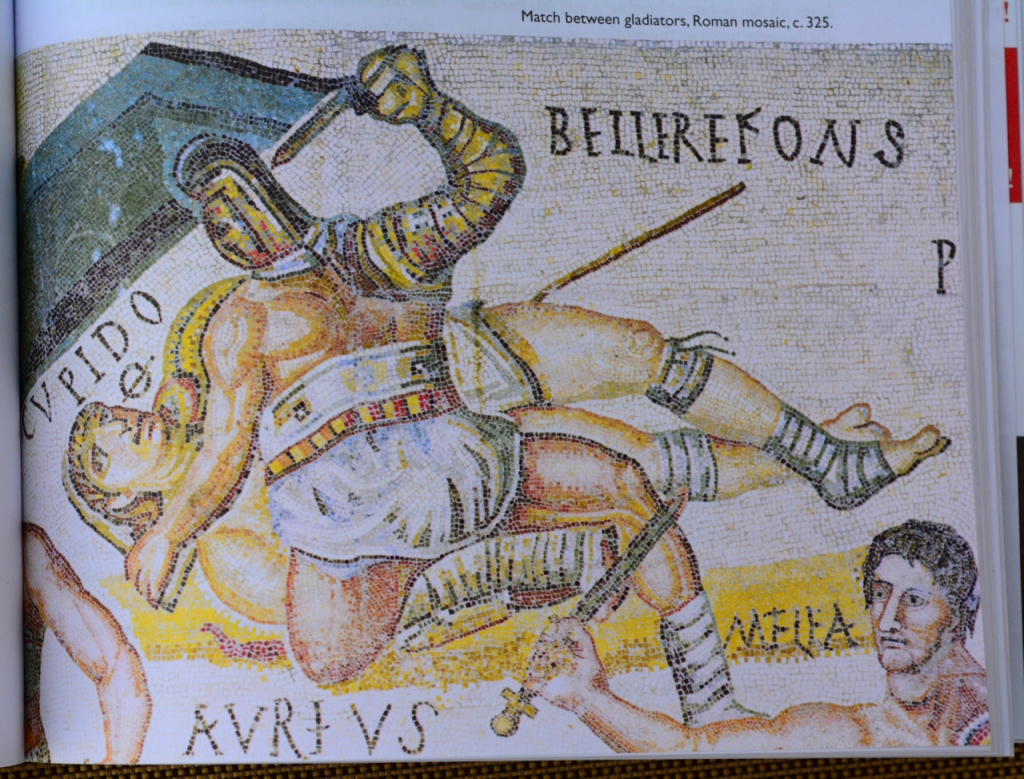[CATEGORIES: Literature, Lapham’s Quarterly, Reading, Book Review, Sports]
[Click HERE to see my previous posts referencing Lapham’s Quarterly.]
[Some of LQ’s contents are available free.]
[L.Q. cover and art from L.Q. Spring 2010: Sports & Games.]
A review continued.

Habeas Corpus. According to Wikipedia and Merriam-Webster this is Medieval Latin meaning literally “You may have the body” . Also, variously, “may (let) you have the body”.
The body to which I here refer are the main sections of Lapham’s Quarterly, always titled Voices in Time. Our voices this issue are divided into:
The Player
The Game
The Fan
The Players talk about themselves playing the game.
Some of the games referenced in the first section:
Baseball
Boxing
Roulette (Russian!)
Billiards
Polo
Ice Hockey
Gladiator
Basketball
Sumo Origins
Courtier (?!)
Sportswriter
Emperor Gladiator
Baseball Fiction
Running – Miler
Steeplechase
Cockfight
Betting
Chess
Tricycling
Hunting
Women’s Baseball
Golf
Soccer
Horse racing

Judging from the extract from Virgil’s Aeneid, boxing hasn’t changed much in over 2000 years. How could it?
Lermontov’s piece on Russian Roulette from his fictional novel gets one’s attention:
“And if predestination actually exists, why then are we given free will and reason, and why must we account for our actions?” (p. 28)
“I offer you to try out on me whether a man may dispose of his life at will or a fateful minute is assigned to each of us in advance … Who is willing?” (p. 28)
Introducing unknowns to me like Lermontov is how L.Q. sets me off on lengthy jaunts through Wikipedia. There you will find a fairly lengthy bio on this czarist-era accomplished painter, poet, and novelist who died in a duel at the age of 26. When I was 26 I was still trying to find myself. (I haven’t stopped looking.)

Hockey player Eric Nesterenko is insightful on playing.
“There’s an irony that one gets paid for playing, that play should bring in money. When you sell play, that makes it hard for pure, recreational play, for play as an art, to exist. It’s corrupted, it’s made harder, perhaps it’s brutalized, but it’s still there.” (p. 34)
“The whole object of a pro game is to win. That is what we sell. We sell it to a lot of people who don’t win at all in their regular lives. They involve themselves with their team, a winning team.” Aye, their’s the rub. Living our lives vicariously through celebrities both sport and screen (movie or tv).
Roger Bannister’s detailed account of breaking the four-minute mile earned my coveted two-asterisk annotation (**), as did Andre Agassi’s well-written account of a grueling U.S. Open tennis match against Marcos Baghdatis. Agassi’s is the first extract in The Game section and as such is as much Player as Game.
Blaise Pascal is noteworthy on Man’s easy diversion with games. Lewis Carroll offers Alice’s thoughts on the odd rules in hedgehog croquet.

Lucian, living from c. 125-180A.D. opines on Why Sports? It’s a lot of work for seemingly little return.
Ovid waxes poetic:
“…a russet glow fanned out evenly over her pale, girlish body, as when a purple awning covers a white-marble surface, staining its artless candor with counterfeit shadow.” (p. 124)
The footrace is exciting too!
One might find Ovid, Lucien, and Lewis (Carroll) online at Lapham’s nicely done website if one is a good searcher.
Satirist H.L. Mencken is disparagingly hilarious c. 1894 in The Fan section:
“…I still begrudge the trifling exertion needed to climb in and out of a bathtub and hate all sports as rabidly as a person who likes sports hates common sense. If I had my way, no man guilty of golf would be eligible to any office of trust or profit under the United States…” (p. 162) ‘Nuff said for our modern U.S. Presidents.
Hemingway, Twain, and Steinbeck conclude this excellent section. John is particularly eloquent and humorous:
“My feeling about hunting has made me pretty unpopular. I have nothing against the killing of animals if there is any need. I did, can, and always will kill anything I need or want to eat, including relatives. But the killing of large animals just to prove we can does not indicate to me that we are superior to animals but a kind of deep-down feeling that we are not. A room full of stuffed and glass-eyed heads always gives me a feeling of sadness for the man so unsure of himself that he has constantly to prove himself and to keep the evidence for others to see.” (p. 179)
“I don’t expect you will believe that I once sent for a mail-order course in alligator wrestling complete with a practice alligator, so I will not tell you this.” (p. 180)
I enjoyed the corpus of this issue. It is not as intense as some other issues, but it is thought-provoking and even entertaining.
READ.


Love John’s first quote. How perceptive!
LikeLiked by 1 person
I always like the golf quote attributed to Oscar Wilde – “Golf is a game of long walks and poor maths” (or something like that).
LikeLiked by 1 person
Ha ha. Wilde, like Twain and Mencken, had good words for a lot of things.
LikeLike